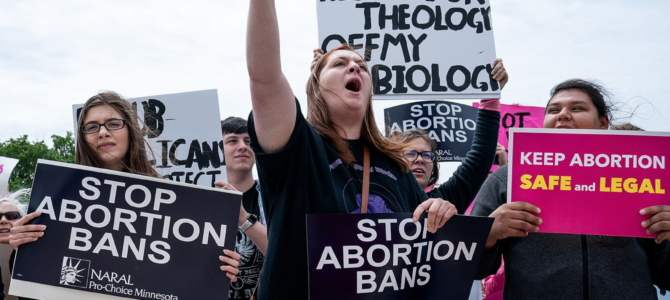
The American Civil Liberties Union recently filed a lawsuit on behalf of the Lilith Fund and Texas Equal Access Fund, claiming that new abortion bans instituted in seven small East Texas cities violated their citizens’ constitutional rights. Citizens of the seven tiny communities — Waskom, Naples, Joaquin, Tenaha, Rusk, Gary, and Wells — say they are ready to fight the ACLU in court and are confident their ordinances will be upheld.
Asserting the right to abortion is “protected by the U.S. Constitution,” the ACLU says, “The ordinances’ existence misleads residents of these cities as to whether individuals can in fact exercise their right to access abortion.”
The ACLU also claims that calling the plaintiffs “criminal organizations” deprives them of their due process and “unconstitutionally punishes them through the legislative process, without a trial.”
The Fight Over Whether Abortion Is a Constitutional Right
The director of Right to Life East Texas, Mark Lee Dickson, said the people involved in passing and defending the ordinances are standing their ground. He shared with me some of the statements he’s gathered in his work on the abortion bans.
Rusk City Councilman Martin Holsome had a positive outlook on the litigation. “If you’re not being sued by the ACLU, it’s because you’re already doing exactly what they want you to do — nothing.”
Likewise, Joaquin Mayor Bill Baker said his city is “not going to be intimidated by the ACLU. … Our town, our people, are willing to stand and fight for the unborn.”
While pro-lifers across the country flatly reject the ACLU’s claim that abortion is a constitutional right, the scattershot lawsuit does make a claim that’s at least plausible on its face. The lawsuit alleges the language of the ordinance, which is virtually identical in each of the seven cities as well as five more not named in the suit, is “unconstitutionally vague.”
“‘Operat[ing] within’ the cities is defined broadly,” it reads, and “includes, but is not limited to: ‘offering services of any type,’ ‘renting office space or purchasing real property,’ or ‘establishing a physical presence of any sort.’” The ACLU alleges the definition is broad enough to “suppress lawful speech about abortions and other reproductive healthcare” and restrict the right to freely associate within the cities on those issues.
But Dickson says the case is “without merit.” He points to two billboards in Waskom put up by NARAL Pro-Choice Texas and the Lilith Fund for Reproductive Equity in July of last year, after the ordinance was passed. “If NARAL Pro-Choice Texas and the Lilith Fund want to spend more money on billboards in those cities we welcome them to do so,” Right to Life East Texas said in a statement. “The more money they spend on billboards the less money they can spend on funding the murder of innocent unborn children.”
I reached out to Lilith Fund, the Texas Equal Access Fund, and NARAL Pro-Choice Texas for comment on the lawsuit and the billboards, but they did not respond by publishing time.
The city of Waskom did not take any action against NARAL or the Lilith Fund for the billboards. It is Lilith Fund’s core mission that makes it a target of the ordinances. The fund, which shares its namesake with an ancient baby-killing demon goddess of Jewish folklore, provides “direct financial assistance to individuals who want to end a pregnancy but cannot afford the full cost of an abortion procedure,” as stated in the lawsuit. This service, if performed in a city where abortion is outlawed, would make the fund a “criminal organization.”
Will the Ordinances Hold Up in Court?
The ACLU alleges the defendants are spreading falsehood and confusion about abortion and their plaintiffs. But Pastor Jody Hooper of First Baptist Church of Haslam in Joaquin disagrees, saying their town is speaking “truth into a culture that has fallen for lies,” and that “no matter the consequences,” they must stand for “those who cannot stand for themselves.”
The city of Rusk signed a letter obtaining the services of former Texas Solicitor General Jonathan F. Mitchell, free of charge. Dickson told me Mitchell is also representing the other cities mentioned in the suit. Texas Right to Life says it is “confident” the pro-life ordinances will “hold up in court.”
“[These] cities acted within their constitutional rights to self-governance and within the scope of current U.S. Supreme Court abortion jurisprudence,” it stated in a press release.
Dickson says these ordinances do not violate the “undue burden” standard established in the 1992 Planned Parenthood v. Casey decision, which says government regulations cannot put a “substantial obstacle in the path of a woman seeking an abortion before the fetus attains viability.”
Defenders of the laws argue that since Texas permits city ordinances to prohibit things within their jurisdictions (such as alcohol), and the laws do not prevent residents from obtaining an abortion outside the city, they do not impose an undue burden on women. The ordinances “maintain the status quo,” since no abortion providers existed within the cities before the ordinances were passed.
That argument is not a slam dunk, however. It can be argued that if enough municipalities pass these ordinances, taken together they would constitute an undue burden on a pregnant resident of East Texas. Travel times, wait times, and time taken off work (i.e., lost income) all factor into the “substantial obstacle” calculation.
It Takes Faith to Fight Abortion
The Supreme Court acknowledged all this in Whole Woman’s Health v. Hellerstedt, noting that increases in driving distance to abortion providers, while not always constituting an undue burden, can be “an additional burden, which, when taken together with others caused by the closings, and when viewed in light of the virtual absence of any health benefit, help support the District Court’s ‘undue burden’ conclusion.”
The “undue burden” standard of Casey did not erase the abortion entitlement created two decades before in Roe v. Wade, but reinforced it. Forty-seven years’ worth of cards are stacked against the sanctuary cities for the unborn. Legal abortion is a giant, and the dozen-and-counting small Texas towns are, by mortal men’s standards, no match for it.
Yet the audacity and determination of those standing firm for these sanctuary cities for the unborn reflects a strong faith and a distinctly Christian understanding of good and evil. In an interview Right to Life East Texas conducted with Dr. Ivy Shelton, pastor of First Baptist Church in Waskom, he encouraged citizens to remember 1 John 4:4: “Little children, you are from God and have overcome them, for he who is in you is greater than he who is in the world.”
Those who simply hope for an end to abortion would not have passed the ordinance in the first place. The men and women supporting the sanctuary laws have faith, and “faith grows stronger” through trials and tribulations, Shelton said. As Moses told the Israelites before God parted the Red Sea, “Fear not, stand firm, and see the salvation of the Lord, which he will work for you today. … The Lord will fight for you, you need only be still.”
In a sense, it seems the small, unflappable band of men and women behind these ordinances are expecting the sea to part before them as a much stronger army rushes up from behind. But they have put their faith not in courts or public opinion, but in a God who makes a way and has brought down mightier institutions than abortion in America. Perhaps the Lilith Fund, Texas Equal Access Fund, and the ACLU should not be so sure of their victory.









